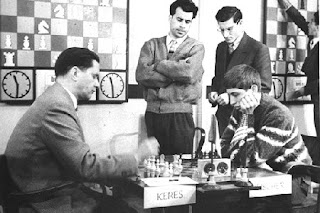 |
| Keres vs. Fischer at the 1959 Candidates Tournament |
The London System is one of those "system" openings that can be used against virtually any black defense and according to the claims requires little memorization of lines making it suitable for average players. One advantage is that London P-structures are almost always achievable, but some coaches think that's a two-edged sword because you don't gain experience playing other P-formations. When facing it as black one does have to be careful! Natural, routine development can lead black down the road to destruction...he will find himself facing a very strong attack or in a strategically lost position.
The system made a comeback in 2006 when Sverre Johnsen and Vlatko Kovacevic, a leading authority on the London, published a book on it. In fact, earlier this year at the Tata Steel tournament Magnus Carlsen used it to defeat 2700-plus rated Evgeny Tomashevsky in 30 moves. Gata Kamsky, Boris Grachev and Vassily Ivanchuk have been known to play it on occasion. My database also has a lot of blitz games by Nakamura and Grischuk. I see a lot of white losses though.
My experience with the London came in the mid-1960s in a tournament in North Carolina. As white I played it against a master opponent who essayed the K-Indian setup and I got slaughtered. After the game he asked me about the line and I told him it had been recommended in one of my books by an IM (don't remember the book or the author). His reply was that he didn't think much of the opening. I never played it again.
The Chess Life article got me curious about playing it against the K-Indian and Gruenfed-type positions and so I looked at a few games but didn't find anything that would convince me to play it on a regular basis.
I am inclined to believe that the recent spate of material on the London System is more hype than anything else. True, a lot of world class GMs have played it, but as mentioned, those games seem to have been mostly in rapid events. The London System is no different than any other opening; it's not a secret weapon that allows those that play it to handle the resulting positions with ease, utilizing ideas and schemes.
In the book Play the London System by Cyrus Lakdawala, he writes, "We don't care how black sets up. Our structure is preordained and takes on all comers." Nonsense! Take a look at how his book is divided into sections:
A) 1...d5 with an early ...e6
B) 1...d5 without an early ...e6
C) versus the Q-Indian
D) versus the Gruenfeld
E) versus Reversed Reti
F) versus K-Indian
G) versus Dutch
H) versus Benoni
I) Other lines
Why is the book divided into nine sections? Could it be because white has to alter his strategy depending on what setup black chooses? If that's the case then we DO care how black sets up, don't we?
A similar opening that I play is the Torre Attack and I have a couple of books on it. In Winning With the Torre Attack by Eduard Gufeld and Oleg Stetsko the authors, like Lakdawala, point out that a lot of world class GMs have played this opening, adding that the Torre is rich in interesting ideas and gives extensive scope for creativity while permitting one to avoid interminable theoretical discussions in the classical systems of the closed openings. Then, like Lakdawala, they proceed to break the opening down into a slew of sections depending on the particular setup black plays.
Pick up any book on the Colle System and you'll see the same thing. Of it, Jeremy Silman wrote, "In amateur play, I don't think there is a more popular and useful opening (from white's perspective) than the Colle System. It's quick and easy to learn, safe, and contains quite a bit of sting."
In Starting Out: the Colle by Richard Pallister you will see six different sections based on which setup black chooses.
If all these systems are so simple and easy to learn, then why do authors need to publish books with a couple of hundred pages of explanations and examples on how to meet different black setups?
If one wants to play the London, Torre or Colle they are decent openings, but don't get hoodwinked into thinking you don't need to put in a lot of effort in order to learn how to play them well.

That pretty much sums up all these easy opening books targeting us amateurs.
ReplyDeleteBit unfair posting a losing London game PGN above where white's moves stray far far far away from today's London formula starting with 4. Nbd2 before e3. you can see the result. And its downhill from there.
ReplyDelete